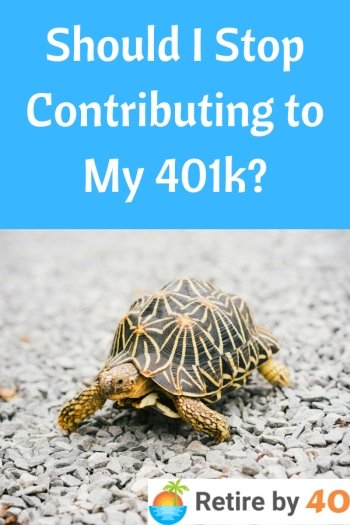
The easiest way to become a millionaire is to max out your 401k contributions every year. It’s a lot of money to put away but trust me. Your 401k will grow and become the foundation of your portfolio. Just start with 10% of your salary and increase it every year. In a few years, you’ll be able to max it out. The 401k retirement account has so many advantages.
- The contribution is tax deferred. You won’t have to pay tax on it until you withdraw later.
- The contribution is automatically deducted from your paycheck. You won’t miss the money because you won’t see it in your checking account.
- Many employers match part of the contribution.
- It’s transferable. When you change jobs, you can roll it over to a new 401k or an IRA.
- Rule of 55. If you’re 55 or older when you leave your job, you can withdraw from your 401k without paying the early withdrawal penalty.
This year (2024), the 401k contribution limit increases to $23,000. If you’re 50 or older, you can contribute an additional $7,500. Wow, $30,500 to sock away. That isn’t easy, but I highly recommend investing as much as you can in your 401k. Retirement will be here before you know it.
However, I turned 50 last year and my 401k contribution dropped off tremendously. What happened? Why did I reduce my 401k contribution. Let’s start at the beginning.
Start Early
I graduated from college in 1997, got a job, and started contributing to my 401k right away. However, I was extremely reluctant to do it. Why should I put so much money aside? I wanted to go out, have fun, replace my junky old car, get a big apartment, and buy nice clothes. I didn’t want to live like a poor college student anymore.
Fortunately, my dad convinced me to start saving for retirement and saved me from a huge mistake. Thanks Dad! He told me the advantages of the 401k and I reluctantly started contributing to my 401k. It was humiliating to park my rusty old Toyota Cressida in the work parking lot because it was full of nice cars. But I got over it and learned how to ignore the Jones. I lived frugally for a few years and gradually increased my 401k contributions until I maxed it out.
My 401k account was slow to get off the ground. It languished for a few years because I didn’t know how to invest. I chased performance and picked the best funds from the previous year. That’s the wrong way to do it. Most mutual funds tend to follow a strong year with weak performances. You need to look at the long-term performance. Fortunately, performance doesn’t matter that much when you just started. The 401k contribution limit was just $9,500 in 1997. It didn’t make a huge difference whether the gain was 3% or 10%. At the start, it is more important to save as much as possible and build up your portfolio.
Anyway, it was good that I made mistakes early and got it out of the way. Now, I don’t chase performance. That’s why you need to start investing as soon as possible. The mistakes won’t be too costly while your portfolio is small.
Turning 50
In 2023, I turned 50. Finally, I can take advantage of the catch-up contribution and save more. However, it turned out opposite. I only contributed $10,000 to my 401k last year. That was the least I contributed to my 401k in 20 years. Why did I reduce my contributions?
The main reason was I didn’t make that much income. I only earned about $17,000 last year. (Our passive income was much more than that.) I could contribute more, but the tax benefit didn’t seem worth it. If I contribute $5,000 more, I’d defer about $1,300 in tax. It isn’t that much. I’ll have to pay tax later when I take out that $5,000 anyway. Besides, I have over a million dollars in my 401k. At this point, the rate of return is more important than saving a bit more.
Besides, I’m starting to worry about the RMD (Required Mimimum Distribution). In 22 years, the IRS will require me to take annual RMD. If my 401k is too big, I’ll have to pay more tax. Well, I’m not too worried. I plan to start withdrawing from my retirement accounts in 5 years. RMD shouldn’t be a huge problem by the time I’m 73.
This year, my income probably will be around $10,000. It might be time to stop contributing to my 401k soon. It’s hard to stop saving, though. I’ve been doing it for so long. I’ll have to think of it as part of my gradual retirement. I’ll slowly reduce my annual retirement savings over the next few years. By 2029, I’ll be ready to start withdrawing.
Lastly, I’ll contribute to my Roth IRA as long as I have earned income. That account has no downside at all. This year, the maximum contribution for the Roth IRA is $7,500 if you’re 50 or older. Don’t miss out on the Roth IRA.
Are you contributing the max to your 401k and Roth IRA?
Passive income is the key to early retirement. These days, I’m investing in commercial properties with CrowdStreet. They have many projects across the United States. Go check them out!
Disclosure: We may receive a referral fee if you sign up for a service through the links on this page.
image credit Melissa Keizer
Passive income is the key to early retirement. This year, Joe is investing in commercial real estate with CrowdStreet. They have many projects across the USA so check them out!
Joe also highly recommends Personal Capital for DIY investors. They have many useful tools that will help you reach financial independence.
Get update via email:
Sign up to receive new articles via email


We hate spam just as much as you

